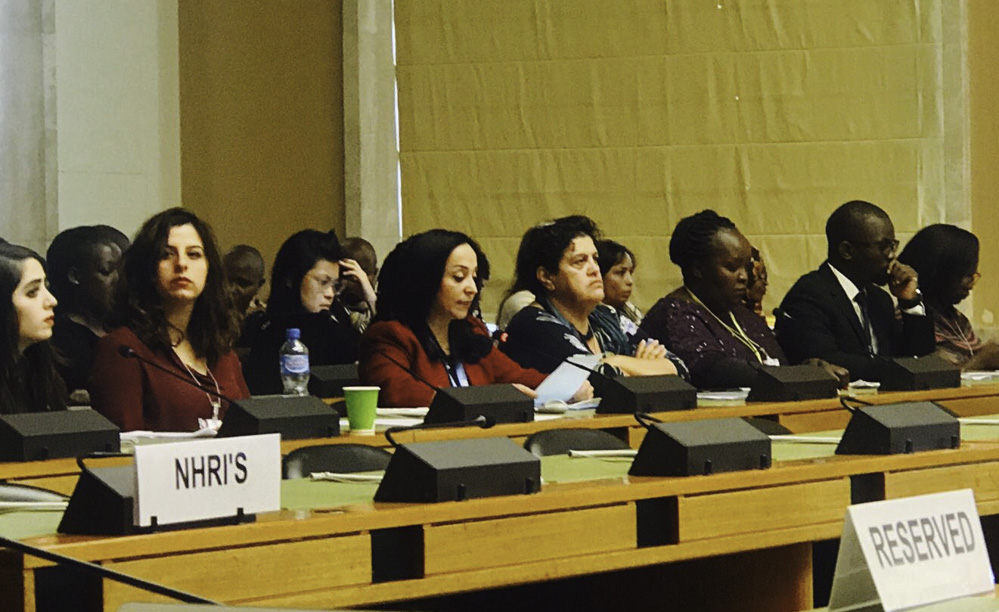UN committee on women concerned by Israel's systemic discrimination against Arab women citizens
The United Nations Committee on the Elimination of Discrimination against Women (CEDAW) has expressed concern about Israel's systematic discrimination against Arab women citizens in the concluding observations of its review of Israel released yesterday, 21 November 2017.
CEDAW recommended implementing special measures to bolster the employment of Bedouin women in Israel, and raised concerns with Israel’s forced urbanization, evictions, and displacement of Bedouin communities in the southern Naqab (Negev) desert region of the country.
The observations were released following CEDAW's review of Israel’s compliance with the Convention on the Elimination of All Forms of Discrimination against Women (CEDAW) on 31 October 2017. Israel ratified the Convention in 1991 and, like all other state parties, is reviewed regularly by the committee.
Adalah Legal Researcher Ms. Soheir Assad attended the review session in Geneva and NGO briefings with committee members, as part of a five-person delegation of the Working Group on the Status of Palestinian Women Citizens of Israel. The delegates presented information on discrimination faced by Palestinian women citizens of Israel in all aspects of life. A state delegation represented the Israeli government before the committee.

Adalah Legal Researcher Soheir Assad (second from left) at the CEDAW review session in Geneva. (Photo by Adalah)
Prior to the review, Adalah submitted a report to the committee and contributed chapters to the Working Group’s joint report to the committee ahead of the review session. The committee raised many of the concerns highlighted by Adalah and the Working Group in our reports.
Key concerns and concluding observations (COs) of the Committee follow. The committee expressed concern about:
- Discrimination: "The systemic discrimination experienced by national minorities, notably women and girls belonging to the Arab and Bedouin communities" and recommended that Israel adopt a comprehensive strategy to eliminate it. (para. 10, 11)
- Ban on Family Unification: "The 2003 Citizenship and Entry into Israel Law (Temporary Order), which was intended to be temporary but continues to be extended, [which] prohibits the granting of status to the spouses of Palestinian Israelis or Palestinian permanent residents in Israel." The committee called on Israel to "facilitate family reunification of all citizens and permanent residents of the State party." (para. 40, 41)
- Employment: About the "the limited participation of Bedouin and ultra-Orthodox women in the labour market," and information that Israeli Arab women continue to face barriers in accessing employment. It called on Israel to "adopt concrete measures, including the use of temporary special measures, to improve the participation of Bedouin and ultra-Orthodox women in the labour market, and remove barriers faced by Israeli Arab women in accessing employment." (para. 44, 45)
- Bedouin women in the Naqab (Negev): "The plan to develop Bedouin localities [in the Negev, Resolution No. 2397] is accompanied by forced urbanisation, evictions and displacements, and that the State party continues the demolitions of homes and schools in Bedouin communities such that Bedouins are forced to relocate." The committee recommended that Israel: "Take concrete measures to improve education, employment, health, and housing outcomes for Bedouin women and girls, including by ensuring that action plans for their empowerment have clear indicators and benchmarks and that their implementation is monitored and regularly evaluated." (para. 54, 55)
- Human rights defenders and NGOs: That "following the adoption of the Anti-Boycott Law and Naqba Law in 2011, human rights defenders, including Israeli and Palestinian women, have been subjected to severe restrictions on their activities, including through limitations to their financing." The committee recommends that "the State party take specific steps, including through legal amendments, to create an enabling environment in which Israeli and Palestinian women human rights defenders and non-governmental organizations working on gender equality and women’s empowerment may freely conduct their activities without undue restrictions, including on funding by foreign sources." (para. 38, 39)
CLICK HERE to read CEDAW's concluding observations on Israel












